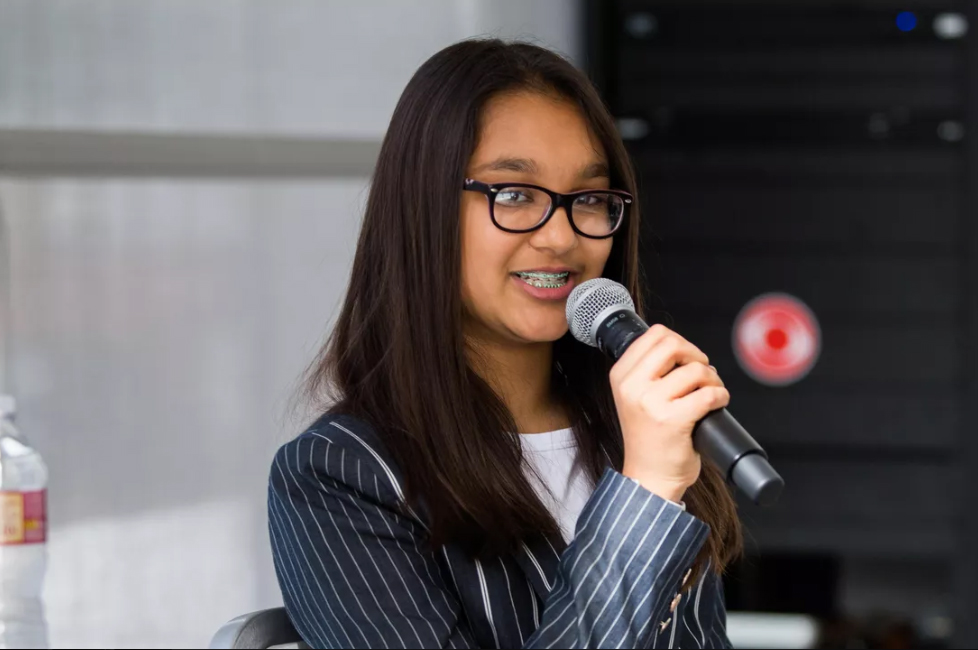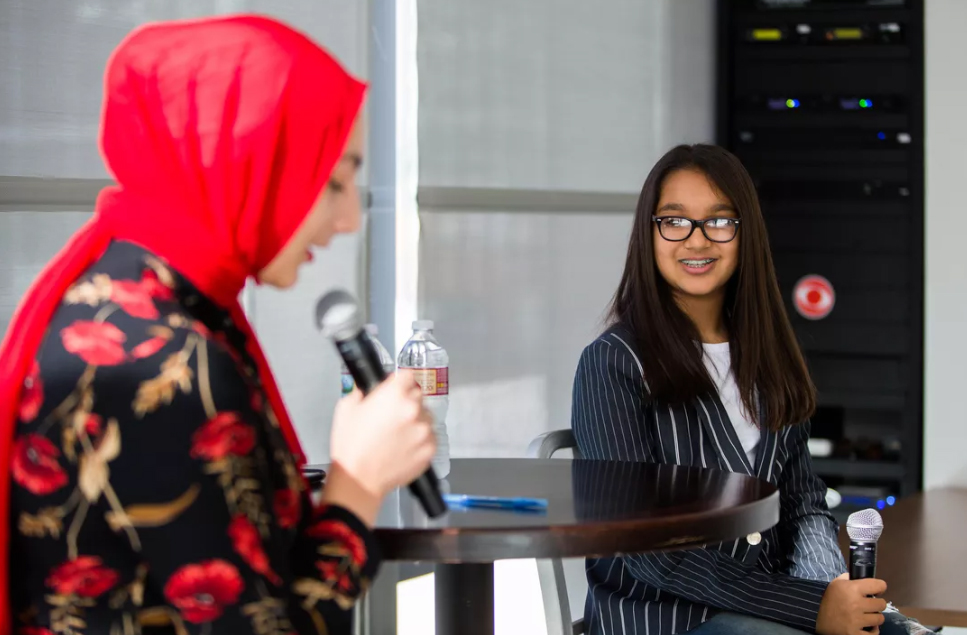
This 11-year-old CEO wants to teach kids everywhere to code
Coder Samaira Mehta talks about why age is just a number, and why she wishes she could clone herself. Big goals.
Samaira Mehta says she’s just a normal 11-year-old. She likes strumming the guitar, singing and playing outside. But one thing makes Mehta stand out from other kids her age: She holds the title CEO.
At 7 years old, Mehta created a board game called CoderBunnyz that teaches basic coding concepts. Two years later, she launched CoderMindz, which she calls the “world’s first-ever artificial intelligence board game.” As co-founder and chief executive of a company also called CodeBunnyz (her mom, who has an MBA, is co-founder) she sells both games, and companies like Walmart and Facebook have partnered with her to donate the titles to libraries and schools around the world. The young Mehta is also the founder of Yes, 1 Billion Kids Can Code, an initiative that aims to get — you guessed it — 1 billion kids into coding by the time she graduates college, around 2030.
“I’m an ordinary girl,” Mehta told me during a Q&A at CNET headquarters in San Francisco last week. “I just choose to work toward an extraordinary goal.”
Extraordinary is a good word to describe her quest. Mehta has led more than 150 coding workshops at companies like Google, Microsoft and Intel. She’s also spoken at more than 50 conferences, including Mobile World Congress, the world’s biggest phone show. She has even bigger dreams for the future, including becoming president of the United States.
Mehta’s passion is apparent as she confidently speaks about her goals and the need to bridge the gender gap in tech. When asked why it’s important to share her love of coding, she responds with an enthusiasm that makes you forget her age. Even when I ask her what piece of technology she wishes could be invented just for her, her answer ties directly to her bigger goals.
“I can’t be everywhere at once,” she told me. “The coolest piece of tech that could be created for me is a device that would let me clone myself, and it could bring me to every place in the world so that I can do workshops and I can teach more and more kids.”
In our conversation, Mehta talked about what got her interested in coding, the challenges she faces as a young female and why it’s important for girls to be involved in STEM (science, technology, engineering and math). Here’s an edited transcript of our conversation.
Q: Let’s start off with the basics. How did you get into coding?
Mehta: I got introduced to coding when I was 6 years old and my dad [an engineer] pulled a prank on me. He showed me something on his computer, which had one button and then there was a command that said “Press this if you’re beautiful.” He told me to give it a try. But when my mouse pointer touched the “You are beautiful” command, it just disappeared. I was surprised. I was like, “How did you do that? Am I not beautiful? What’s going on here?”
He told me he used something called coding to create that, and that got me really excited and involved in coding because I wanted to prank my friends in a similar way. I asked my dad to teach me this coding thing, and the moment I started, I fell in love with it. That’s when I realized this is something I want to expand upon.
So did you prank your friends?
Eventually, yes.

What led you to making CoderBunnyz?
I started talking to some of my friends about how much I enjoy coding, but I saw that they didn’t have the same passion I did. And I was like, Why is it this way? Coding is something I believe is really fun. So I mixed my love of board games and my passion for computer coding together to create a board game that will teach kids coding.
Eventually, I started using this with my friends, and some slowly started to regain an interest in coding. Beforehand, they may have done some of the very basic websites, but maybe they didn’t enjoy it. I saw that kids were starting to really enjoy playing CoderBunnyz, and they actually started to enjoy coding. That’s when I realized I wanted to start doing workshops for other kids.
You bring up a good point: We always hear about the lack of girls and women in STEM, and you mentioned that some of your friends weren’t interested in those fields. Do you still see that, and why do you think that is?
I think a lot of girls struggle that way. They feel it’s something only boys can do, but I don’t believe that’s correct. I believe girls can be as smart as boys, including in the engineering field, if they choose to work hard and passionately toward what they believe in.
You also created CoderMindz, a “coding-based artificial intelligence board game.” What does that mean?
I’ve used some of the coding concepts, such as sequencing and some Java programming, to introduce some of the concepts of artificial intelligence, such as training, inference and image recognition. AI is a topic a lot of people have heard of, especially kids like me, but they don’t really know what it is.
Let’s also talk about Yes, 1 Billion Kids Can Code. What led to that initiative?
I started off doing workshops for kids at libraries, schools and companies, and I saw how fun it was teaching other kids. I also saw how much they were learning from it.
Yes, 1 Billion Kids Can Code is an initiative I started with the goal of helping 1 billion kids in the world gain access to STEM and coding tools, because even if they don’t choose to become a professional coder when they grow up, I believe a basic coding understanding can make them better thinkers, leaders, dreamers and creators of the next generation.
Have you ever felt dismissed because you’re young, or have you ever felt like people scrutinize you or don’t take you seriously because you’re a young female?
Being young is actually one of the biggest problems I face. I believe people look at you differently when you’re younger. I’ve seen that people don’t take me seriously. Especially being female, people think, “She’s just an 11-year-old girl. What can she do?” But I believe age is just a number. Anyone can do anything if they choose to work hard toward it.
Former First Lady Michelle Obama sent you a letter once. What did she say?
She told me I was doing great and that all I had to do was keep working toward my goals and passions, and that nothing can stop me.
How did you feel when you got that letter?
I was tremendously honored. It was one of the greatest moments of my life, and I felt like all I was doing — all my goals and passions, all my small dreams — were starting to make a bigger impact in the world. It gave me motivation to keep working harder and to keep doing what I love.
Who were some of your role models when you started to get into coding?
My parents have obviously helped me so much. But there are two specific people who stood out to me: Grace Hopper and Ada Lovelace. Ada Lovelace was the creator of computer programming in a way, and she was a woman. If girls could do something that great back then, they can do something that great now.
And Grace Hopper is truly an inspiration. It’s so inspiring how no matter what the limits or boundaries were, she pushed them, and she worked hard toward achieving what she truly wanted.
What accomplishment are you proudest of so far?
Seeing the smiles on kids’ faces after they write their first code at my workshops. More than anything, it shows me that all my work has paid off. Kids are getting so involved and engrossed in the game. That makes me feel so motivated and honored and happy.
Yes, 1 Billion Kids Can Code isn’t your only goal. What are some of your other goals, and what do you want to be when you grow up?
One of my biggest goals is to get more girls into tech. I have an interview series called Cookies with CoderBunnyz where I interview people like educators, entrepreneurs, librarians and tech leaders who kids like me can learn from.
When I grow up, I want to become the president of America. I believe this will give me a bigger platform to reach out to so many more amazing people.
Last but not least, what’s your favorite piece of tech?
Probably my computer. I think it’s really cool how much you can do. And it’s comparatively a really small device. The amount of things you can do with the computer — the amount of code you can write, the amount of things you can build, the amount of software you can create — it’s my favorite tech device.
